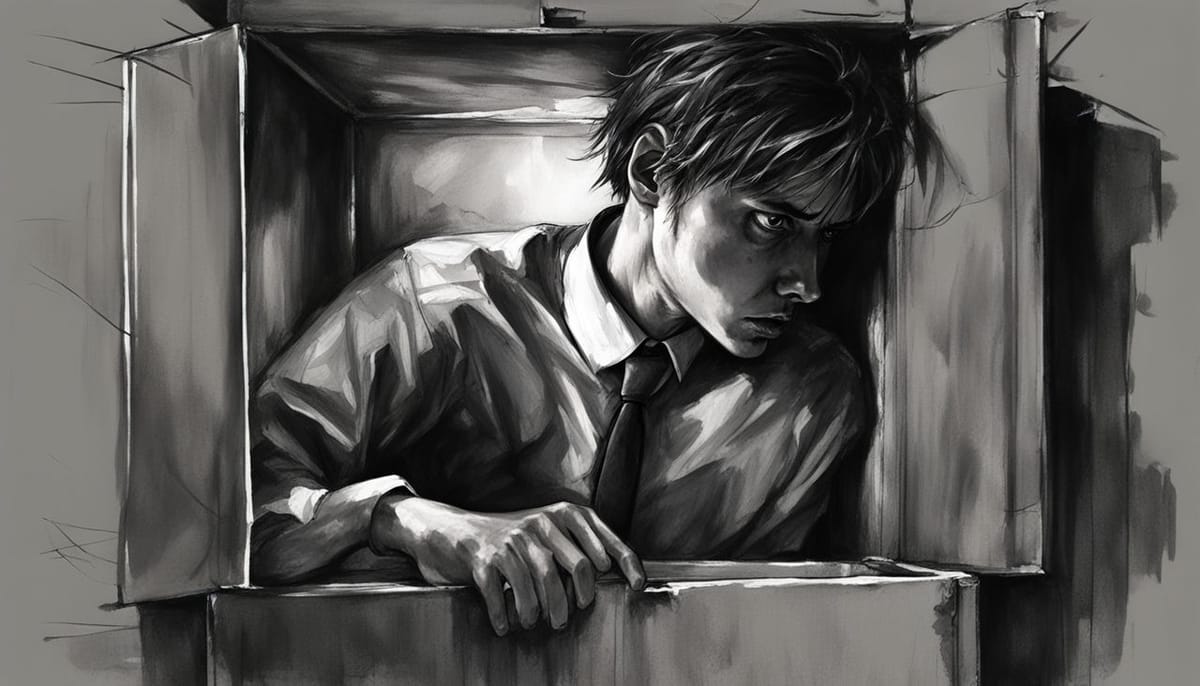Raising Men in the Manosphere

The date was April 28, 2009. I didn't realize it at the time but this would be the date my life truly began.
I wasn't there for the birth of my oldest son, who is technically my stepson though I’ve never seen a difference between the two. At the time, however, my relationship with him was still growing and I had not really come to grasp what it was to be a father. That would all change that day.
My wife had a scheduled C-section so we avoided the stereotypical rush to the hospital I saw in sitcoms over the years. We woke up on that Tuesday morning and drove to the hospital, the calm setting masking our nervous anticipation of meeting the person we created together. The operating room bustled around me while I focused on my wife, lying on the table in a bit of a haze, cut open hip to hip. Then I heard him. For the first time, my son let out a cry and in that moment nothing else in the world existed. The nurses laughed as I jumped around them like a dog whose owner was holding their favorite treat. When they laid him on the table, checking to make sure he was healthy, one searing thought cut through my euphoria: “Holy shit. I'm completely responsible for another person.”
Support Bad Faith Times today
I don't simply mean responsible in the sense that I had to make sure they were clothed and fed. Over the years I had that level of responsibility thrust upon me at various times. Children of girlfriends, step-siblings, and the like. I had plenty of experience changing diapers and making sure kids had something to eat. I mean a deeper level of responsibility. At that moment I went from being a 22-year-old kid worried about himself to a 22-year-old man, upon whom the fate of two young boys now rested. It was my job to raise these boys to be the best version of themselves, even though I had no fucking clue how to be the best version of myself. To help them navigate a precarious world in which I found myself constantly lost. That type of responsibility is partially uplifting but mostly frightening as hell.
Raising boys in today’s world offers a whole host of challenges my parents never considered. They probably should have, but the language and tools simply didn't exist. There was no talk of “toxic masculinity” in the 1990s. Feminism existed only in the “girl boss” ad campaigns by multinational corporations. The worst thing a man could do was show vulnerability. Doing so was derided as “sissy” or, God forbid, “gay.” I never fit into the stereotype of what a man should be. I was never good with cars and didn't much enjoy being outside. I constantly found myself giving into the more basic societal pressures of what it means to be a man. Putting on a mask to fit in. I swore I would raise my boys better. I would break the cycle of performative masculinity that was forced upon me, allowing my boys to be whatever version of themselves felt natural.
As a good leftist, I understand gender to be a social construct. The things we define as masculine are fluid and based on mostly unnecessary societal norms and expectations. If this concept seems foreign to you, simply look at a picture of King Louis XIV who, in his pantyhose, frilly clothes, and oversized wig, was considered the height of masculinity in his time.

The understanding that discussions of gender are complex can cause leftists to avoid discussions of masculinity. This acknowledgment that “being a man” is a messy combination of societal norms cedes ground to the most bad-faith operators on the political right who cut through that mess with a clear and distinct message of what being a man is.
This plainspoken messaging can be attractive to young men trying to find their place. It is, of course, ultimately destructive to those same men. Look no further than Kari Lake's toxic screed just this past week.
"I like a strong man ... we're tired of the beta men ... and we got a number one alpha man in Donald J Trump" -- Kari Lake at CPAC pic.twitter.com/fT4GIhzBny
— Aaron Rupar (@atrupar) February 24, 2024
The Maniacal Manosphere
The understanding that gender is a social construct doesn't end the discussion. Rather it begs the question: What is it constructed of and what would a different construction look like? “Sophisticated opinion rarely gets beyond the elementary observation that masculinity is a social construct,” writes Phil Christman in his fantastic essay What Is It Like to Be a Man? “As for unsophisticated opinion it is a dank cellar most impressively represented by the Canadian academic Jordan Peterson."
Peterson is a founding father of the Manosphere. Utilizing the vague aura of academia, Peterson provides a new thin veneer for very old types of bigotry. Interspersed with banal self-help advice like “clean your room” or “be more responsible" – advice that is received as groundbreaking by the online right – Peterson paints a portrait of masculinity entirely dependent on the projection of strength and domination.
Peterson believes to truly be a man is to be both physically and intellectually dominant of both the perceived inferior sex and inferior men. Peterson clings to the archetypical “strong man” to justify otherwise unjustifiable hierarchies as “the way things are supposed to be." Women nurture, and men protect in Peterson’s world. Thus, it makes sense that more men would be in positions of power, while women are confined to caring for the home. The presumption here is that men are incapable of nurturing and women incapable of protecting. That to care for or nurture someone is inherently feminine and thus should be avoided by “real men" – notion that a modicum of lived experience or the reading of one (1) history would easily dispel. One look at Jordan unveils his hypocrisy. It’s funny how many fascist assholes crying for the return of “strong men” are wispy little fucks who look like they've never done anything physical in their entire life.

Peterson may be Incel Jesus but he is far from alone in this crusade. The online discourse is littered with ghouls trying to get young men to join their grift. Former kickboxer-turned-sex-criminal Andrew Tate is one of the more notable assholes who have found that telling young men that women are the reason for all their problems can be a lucrative business. Most of these men's philosophy boils down to the following: Being a sexist asshole is not only good, it's the correct way for a man to act.
This message can be enticing for impressionable youth, many of whom have little to no social life. Rather than telling young men to put themselves out there, try new activities, and confidently be themselves to find a partner, these grifters tell these young people that they are entitled to a woman’s attraction and that if women aren't attracted to them it's because of feminism or evil leftists telling women not to love these supposed strong “real” men. They are made to believe that they are entitled to women.
Not all who dabble in the Manosphere are as painfully obvious as Tate or Peterson. There is an entire industry of vaguely right-wing coded media and “self help” gurus who provide a gateway to some of the more misogynistic parts of the online world. These range from Joe Rogan, who platforms some of the most virulent sexists and bigots the world has to offer, to the sort of Barstool Republicans who think wokeness has “gone too far” and “comedy is being silenced" – comedy of course being make fun of trans folks. Navigating these landmines and understanding who is lying to you can be impossible for adults, much less impressionable teenage boys desperately looking for somewhere to belong.
Capitalism, you won't be shocked, has its role to play in the proliferation of the Manosphere. All of these “influencers” and media figures are radically pro-capitalism. That’s how they have the funding to live these lavish lifestyles that attract so many young men. Generally, their wealth comes from one of two places: A rich benefactor or grifting people and selling the “rich lifestyle.” There is a reason the Daily Wire pays Peterson millions a year. It's not because Jordo generates that much revenue. It’s because the billionaires who fund the Daily Wire appreciate the role he plays as a conduit for capitalism.
Capitalism is great, Peterson tells impressionable young men, so don't blame the capitalists for your lot in life. Instead, blame all-powerful feminists or trans people.
These “manly men” would have young men believe that being a man is to actively shun anything comforting. To willingly wear uncomfortable jeans, to deal with pain rather than see a doctor, and to reject help even when it is desperately needed. We must not be vulnerable because the worst thing a man can be is a burden. Unless, of course, he’s burdening his wife whose duty it is to comfort the man and shoulder all the shit a man feels he can't show the rest of the world.
This attitude is not only destructive to the relationships a man forges, it is destructive to men. A lot has been written about the male suicide rate. Most of these men are lonely, tired, and in desperate need of help, while society keeps telling them not to seek it.
A Better Form of Masculinity
It is incumbent upon those of us who want to reject toxic masculinity to not just point out how moronic and pig-headed these men are but to provide an alternative vision of masculinity for young men looking for guidance in a fucked up world that provides very little. To show that being a man isn't about domination, it's about support. Supporting those you love and being there for them when necessary, but also accepting support when necessary.
Rather than just rejecting any mention of masculinity as reinforcing patriarchy, the left – and anyone repulsed by the messaging of Jordan Peterson and his ilk – must show a different form of masculinity that rejects the patriarchal norms society pushes on us. That going to therapy isn't a sign of weakness, but a sign of strength that allows us to be more in control of our emotions rather than lashing out at those around us. Strength allows us to acknowledge we can’t do it on our own, and that we need to stick around for those who rely on us. We need to show that taking care of the “woman’s work” like caring for the children or washing dishes isn't just about supporting our partner but a part of life, one that can be incredibly rewarding.
Most of my most coveted memories with my boys come from caring for them when they were little. I wasn’t “helping out," I was simply being a father. And that was enough.
While it can be easy for the more “woke” among us to laugh at this bullshit and write off these right-wing clowns, it’s easy to forget that not everyone has the intellectual foundation to internally combat the right's destructive message. This, above all else, is what I’ve tried to teach my boys. I’ve thought a lot over the past 15 years about the men I want them to become. I've thought a lot about who and what I want to influence them. I’ve banned them from watching certain creators online because they’ve made problematic comments. But preventing them from being exposed to the myriad of manosphere influencers online forever is a fool’s errand. There are too many. You have to give them the tools necessary to recognize and counter those who would have them subscribe to unjust patriarchy. I’ve told them the importance of social justice issues and why we have to fight against systems of oppression.
My wife and I try to model the behavior we want them to emulate, to varying degrees of success.
Support Bad Faith Times today
In my house, there aren't assigned gender roles. I tend to cook and clean, while my wife enjoys building things around the house and working on cars. We have shown them that being in a partnership is less about assigning work based on preconceived societal norms and more about navigating each other's strengths and weaknesses and finding a good balance. More than anything we’ve shown our sons that strength isn't about domination of one another; it's about supporting one another. It's about lifting up your partner when they're not strong enough on their own, and being willing to accept help when you're not.
Raising children in the modern world sometimes seems like a Herculean task. Raising men who are better than we are seems all the more daunting. However, we have to do it. We have to be better. I go back to Phil Christman’s essay “Masculinity is an abstract rage to protect.” I love that line. That’s a lot of what it boils down to, being a man, this abstract rage that something bad will happen to the people you love and you won't have been prepared enough to protect them.
But what is lost in that is that men need to protect people from other men. The answer to this problem isn't to raise men who are better capable of domination, but rather to raise fewer men from whom people need to be protected.
Follow Anthony Reimer on X at @mrmeseeksff.
Comments ()